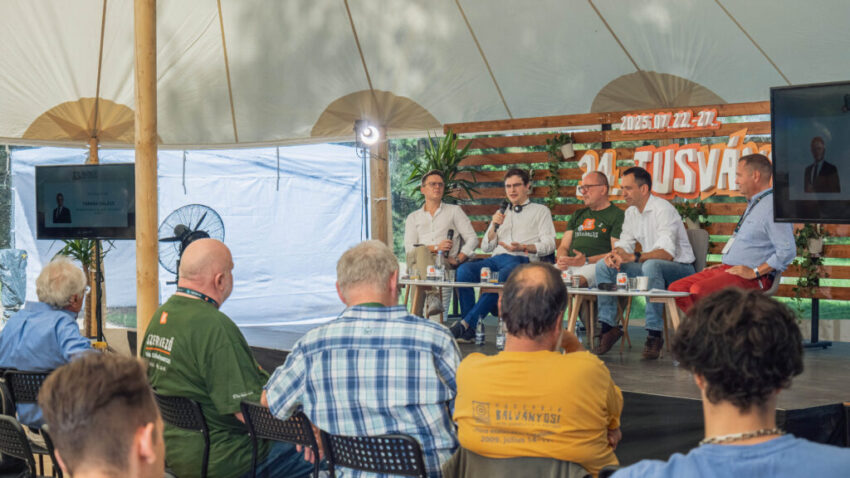The 34th annual Bálványos Summer University and Student Camp, better known by its colloquial name Tusványos, is at full swing right now in Tusnádfürdő (Băile Tușnad), Transylvania, Romania. People gathered to hear another fascinating panel discussion on Wednesday, 23 July.
This time, the featured speakers were Carlos Roa, a visiting fellow at the Danube Institute; MP Zsolt Németh, head of the Foreign Affairs Committee in the Hungarian National Assembly and a co-founder of the Tusványos event series; Botond Csoma, Member of the Chamber of Deputies of Romania for the Hungarian minority party RMDSZ; and Zsolt Szilágyi, Vice Chair of the European Free Alliance. Balázs Tárnok of Ludovika University’s John Lukacs Institute took on the role of the moderator.
MP Németh has recently voiced his hopes in interviews that the second Trump administration may bring about ‘Pax Americana 2.0’, a concept he was asked about by the moderator. He explained that the first six months of ‘the Trump Tornado’ included very intense American diplomacy. He opined that the way other countries were willing to strike new trade deals with the US has demonstrated that the world of geopolitics may still be in a unipolar era. President Trump is currently threatening the EU with a 30 per cent tariff if they do not come to a new agreement as well—MP Németh believes that agreement will eventually be reached.
In the meantime, President Trump is also working on peace deals. His administration managed to broker one between the Democratic Republic of the Congo and Rwanda, the speaker pointed out. However, he has failed to get one between Russia and Ukraine, despite his campaign promise. On that matter, Németh has stated that we have always known that Russia was the aggressor in the conflict, and now we know that they are the ones still pushing for war as well. That is why the proposed escalation by President Trump is reasonable, he opined.
Mr Roa declared that he is much less optimistic than his fellow panellist, despite being from the United States. He told the audience that his home country is not as strong militarily and economically as it was 30 years ago, and it is ‘making moves on the chess board it cannot afford.’ Additionally, he stated that Europe too could be a military and economic powerhouse, but the leading EU Member States are bogged down by the big expenditures on their welfare states; and some want to expand those welfare benefits to waves of incoming migrants as well.
MP Csoma described the current state of geopolitics as ‘a transitory state, which is not unipolar nor multipolar yet.’ The United States is still a prominent player on the world stage, although not as dominant as it was 20 years ago. Its main rival is not Russia, however, but China, as the speaker explained. Meanwhile, Mr Szilágyi talked about the recent commitment by NATO countries to raise their defence spending to 5 per cent GDP, which may end up being detrimental to the United States, he pointed out, if European nations spend the additional funds on weapons manufactured by the European defence industry, as opposed to American weapons. He also voiced his misgivings about the fact that within the EU, dissent is met with ostracism, as seen in the case of the new Patriots for Europe group in the European Parliament.
Regarding the question of when peace can be achieved in the Russo–Ukrainian war, MP Németh shared that President Xi Jinping of China has invited both President Trump and President Putin of Russia to the celebration of the end of World War II on 3 September in Beijing. If President Xi ends up taking Trump’s side on peace, and decides to put pressure on Russia by decreasing its oil imports from the country, that could be a major turning point in the peace negotiations.
Meanwhile, on the issue of Ukraine’s proposed accession to the EU, Mr Szilágyi has passionately stated that democratic principles are currently being eroded in Ukraine, with political parties and newspapers being banned. He also declared that ‘the war cannot be an excuse for the Ukrainian state to hold ethnic Hungarians in Transcarpathia hostage’, referring to, among other things, the death of József Sebestyén at the hands of Ukrainian conscription officers.
Related articles:
The post Pax Americana 2.0? Discussion at Tusványos 2025 appeared first on Hungarian Conservative.
Click this link for the original source of this article.
Author: Márton Losonczi
This content is courtesy of, and owned and copyrighted by, https://www.hungarianconservative.com and its author. This content is made available by use of the public RSS feed offered by the host site and is used for educational purposes only. If you are the author or represent the host site and would like this content removed now and in the future, please contact USSANews.com using the email address in the Contact page found in the website menu.








